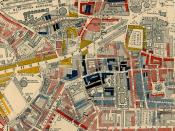"It's a fine life!" A powerful proclamation. What exactly does it say? For whom is it a fine life? Certainly not the lower class. I suppose some had a fine life, but not everyone did. Most, certainly did not.
The nobles, it is true, had a fine life indeed. They did very little, paid very little, and received much. Why should they care about those below them? Most believed in "social Darwinism," so they believed those below them are there for a reason, that they just weren't good enough. It's very plausible someone from the noble class would have summed up life in general, in his arrogance or stupidity, as being a "fine life." To him, his family and other members of the nobility, the statement couldn't be more true.
The middle class, or bourgeoisie, had a good life. Some not as good as others, but, between the middle class, there was a "fine life" to be had.
They worked, this is true, but worked for a substantial amount of money. They got up, went to work, took breaks when they wanted to because, well, because they could. They owned the factories, so who was going to stop them? If a middle class member worked hard they could grow to the wealth, power, and prestige a noble family had. Many nobles married into middle class families for the money. That is not to say the nobles didn't look down on the bourgeoisie. Nobles viewed the bourgeoisie with scorn, but loads of money is loads of money. A cocky upper middleclassman could definitely be seen saying something as bold as "It's a fine life!"
Now what of the people the upper and middle class detest. The lower class in the middle classes eyes were just machines. They worked in crappy conditions...


